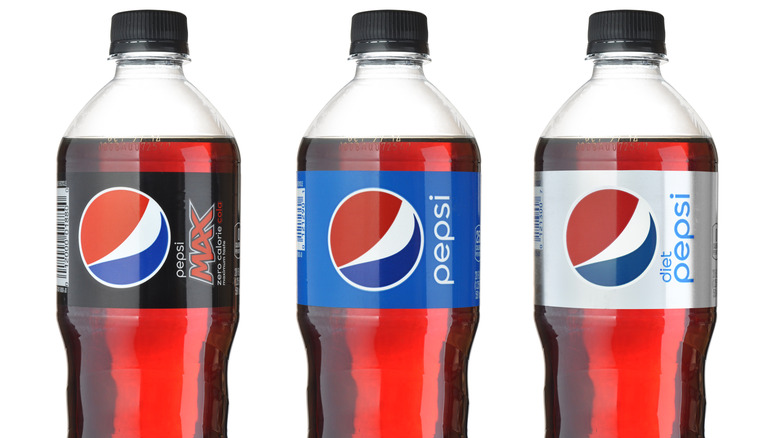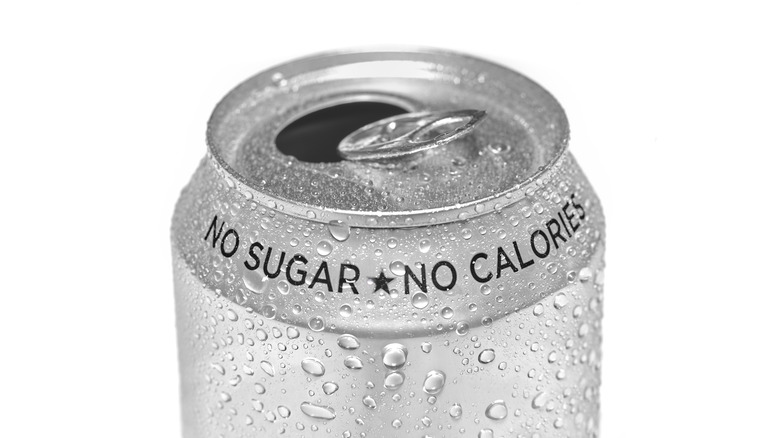Diet Pepsi Vs Pepsi Zero: Is There Even A Difference?
I have sworn up and down that Diet Pepsi and Pepsi Zero are the same drink and the advertising was real gimmicky. I felt like they had the same differences as Diet Coke and Coke Zero, namely that both skip the sugar, promise a lighter drink, and aim for that familiar cola taste without the calories. Turns out they're not exactly twin drinks upon further review — but it's still not a huge difference, in my opinion. If you've ever grabbed one thinking it was the other, you might've noticed that the taste hits a little differently, and that part isn't a fluke; it comes down to the recipe.
Even though they're made by the same brand and serve a similar purpose, each drink has a different formula. Diet Pepsi came first. It's been around since the 1960s and uses aspartame as its sweetener. Pepsi Zero Sugar (formerly called Pepsi Max) is newer and uses a blend of aspartame and acesulfame potassium. It's also got more caffeine and is marketed as a bolder, closer-to-original Pepsi alternative.
They're both sugar-free colas, but they're built for different taste buds. Some people swear by Diet Pepsi for its crisp, lighter finish. Others say Pepsi Zero tastes more like regular Pepsi with a bit of extra kick. If you're just trying to ditch the sugar, either one works. But flavor-wise, they're not really interchangeable.
The ingredient breakdown tells you everything
The main split between Diet Pepsi and Pepsi Zero is what they contain (duh, I know). Diet Pepsi keeps things simple with carbonated water, caramel color, aspartame, phosphoric acid, and natural flavors. It's lower in caffeine (how much caffeine is okay, anyway?) than regular Pepsi and definitely lighter than Pepsi Zero. If you're used to Diet Pepsi, you're probably familiar with the mild, almost dry cola flavor it gives off. Some describe it as cleaner, others say it leans toward flat if it's not ice-cold. I've always hated the way diet pop tasted, and wondered who even invented this beverage which tastes like slightly sweetened water. Either way, it's known for being consistent.
Pepsi Zero, on the other hand, packs a bigger punch. It uses two artificial sweeteners — acesulfame potassium and aspartame — which together make it taste a little richer and more intense. It also has extra caffeine, sitting higher than both regular Pepsi and Diet Pepsi. That's why it's often pushed as the go-to option for people who want more energy or who miss the full-bodied flavor of regular soda but not the sugar. The caffeine boost alone gives it a little more bite, which some people like more.
If ingredients matter to you, or if caffeine is something you're watching, these differences can help you decide which can to reach for. They're small details, but they make a real difference in how each one tastes and feels.
Taste and habit determine the right choice
Some people don't care what the label says, they just want what tastes good to them. Others are loyal to one version because it's what they've always picked up. With these two drinks, taste is the real dividing line. Diet Pepsi has a smoother, lighter profile, with a slightly dry finish that doesn't try too hard to imitate full-sugar Pepsi. For folks who drink soda all day or want something mellow, that's the draw.
Pepsi Zero is the stronger option in every way. More caffeine, deeper flavor, and a sweetness that sticks around longer. If you're used to regular Pepsi and want something that gets close to that without the sugar, Pepsi Zero tends to win people over. Some say it tastes more "complete," especially when served cold or with food.
But preferences are personal. Taste memory plays a role. If you grew up on Diet Pepsi, that's probably still the one that hits right. If you're switching from regular soda and want something bold, Pepsi Zero might be your new fave. Neither is better than the other, it just depends on what you want in the moment.


